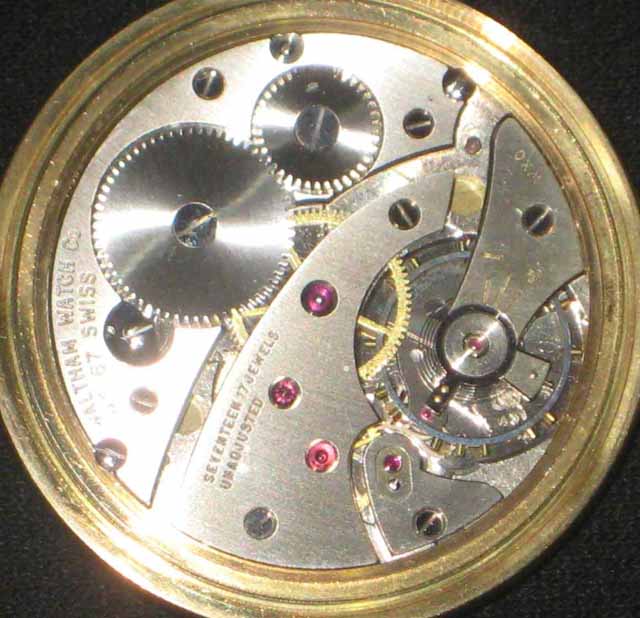
| WWT Shows | CLICK TO: Join and Support Internet Horology Club 185™ | IHC185™ Forums |

|
• Check Out Our... • • TWO Book Offer! • |
Welcome Aboard IHC185™  Internet Horology Club 185
Internet Horology Club 185  IHC185™ Discussion Site Main Page
IHC185™ Discussion Site Main Page  Horological Discussions, Questions and Answers
Horological Discussions, Questions and Answers  Pocket Watch Discussions
Pocket Watch Discussions  How to regulate when there is no regulator needle?
How to regulate when there is no regulator needle?
 Internet Horology Club 185
Internet Horology Club 185  IHC185™ Discussion Site Main Page
IHC185™ Discussion Site Main Page  Horological Discussions, Questions and Answers
Horological Discussions, Questions and Answers  Pocket Watch Discussions
Pocket Watch Discussions  How to regulate when there is no regulator needle?
How to regulate when there is no regulator needle?Go  | New Topic  | Find-Or-Search  | Notify  | Tools  | Reply to Post  |  |
Late Swiss and Soviet movements are notorious for this. In the image below, the regulator needle is non-existant. What is the "proper way" of regulating this movement? With what, and how, to "grab" the regulator? Krister Olsson mentioned this problem while replying to my previous topic here.  | |||
|
Some Chinese movements are the same. It looks like you would have to very carefully move the tab that holds the regulator pins. Probably with a pin or toothpick being careful not to insert it too far and contact the hairspring itself. | ||||
|
That is correct. I have a watch with this type of setup. Basically the guide that holds the hairspring (opposite of where the needle would be) actually becomes the needle. In this case slide it up to shorten the hairspring (speed up) and back to slow it down. IT IS A PAIN, but can be done. I worked on a coworkers watch like this as well and was able to get it timed pretty close but since you are so close to the point of rotation a small move can be big. At least with a needle you can make really minor movements. | ||||
|
Paul, Do you remember our discussion last week in this thread: How to safely stop balance wheel to sync the time in which you asked about on how to safely stop a balance wheel? We learned it is risky to stop a balance wheel. Adjusting this type of regulator is even riskier IMO, because of the amount of pressure required to move the regulator. The risk being in either case damage to the watch if control of the tool is lost. Donald and Dan have described the only method I know of to adjust a regulator without a pointer, but it is for me a very risky proceedure due to the possibility of the tool you are pushing with slipping and striking the hairspring and/or balance wheel (or any other exposed part of the watch) and causing damage. I do regulate my watches, and that is why I prefer watches with a micro regulator or at least a pointer. I have a watch or two with regulators with no pointers and I do minimal regulation adjustments or none at all on them due to the risk of the pushing tool slipping and damaging the watch. I have never seen an American made pocket watch without either a micro regulator or at least a pointer. Another reason we love them. | ||||
|
| IHC Life Member |
Personally, I usually regulate these sitting in the Timegrapher. (The watch, not me. Regards, Krister. | |||
|
| Powered by Social Strata |
| Your request is being processed... |
|
Welcome Aboard IHC185™  Internet Horology Club 185
Internet Horology Club 185  IHC185™ Discussion Site Main Page
IHC185™ Discussion Site Main Page  Horological Discussions, Questions and Answers
Horological Discussions, Questions and Answers  Pocket Watch Discussions
Pocket Watch Discussions  How to regulate when there is no regulator needle?
How to regulate when there is no regulator needle?
 Internet Horology Club 185
Internet Horology Club 185  IHC185™ Discussion Site Main Page
IHC185™ Discussion Site Main Page  Horological Discussions, Questions and Answers
Horological Discussions, Questions and Answers  Pocket Watch Discussions
Pocket Watch Discussions  How to regulate when there is no regulator needle?
How to regulate when there is no regulator needle?©2002-2025 Internet Horology Club 185™ - Lindell V. Riddle President - All Rights Reserved Worldwide

